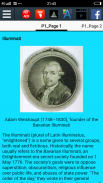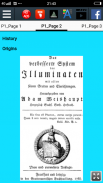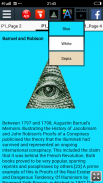








Illuminati History

Illuminati History介绍
The Illuminati (plural of Latin illuminatus, "enlightened") is a name given to several groups, both real and fictitious. Historically, the name usually refers to the Bavarian Illuminati, an Enlightenment-era secret society founded on 1 May 1776. The society's goals were to oppose superstition, obscurantism, religious influence over public life, and abuses of state power. "The order of the day," they wrote in their general statutes, "is to put an end to the machinations of the purveyors of injustice, to control them without dominating them".[1] The Illuminati—along with Freemasonry and other secret societies—were outlawed through edict, by the Bavarian ruler, Charles Theodore, with the encouragement of the Roman Catholic Church, in 1784, 1785, 1787 and 1790.[2] In the several years following, the group was vilified by conservative and religious critics who claimed that they continued underground and were responsible for the French Revolution.
Many influential intellectuals and progressive politicians counted themselves as members, including Ferdinand of Brunswick and the diplomat Xavier von Zwack, who was the Order's second-in-command.[3] It attracted literary men such as Johann Wolfgang von Goethe and Johann Gottfried Herder and the reigning dukes of Gotha and Weimar.[4]
光明(拉丁启示录复数,“开明”)是给几个小组,真实和虚构的名称。从历史上看,这个名字通常指巴伐利亚光明,启蒙运动时代的秘密社团成立5月1日1776年该协会的目标是反对迷信,愚昧,在公共生活中宗教影响,以及国家权力的滥用。 “这一天的订单,”他们在总条例中写道,“是为了杜绝不公正的提供者的阴谋,操作起来没有支配他们。” [1]光明,一起共济会和其他秘密会社,是通过法令取缔,由巴伐利亚的统治者,查尔斯·西奥多,与罗马天主教会的鼓励下,1784年,1785年,1787年1790年[2]在数年之后,该小组由谁声称,他们继续在地下,并负责对法国大革命的保守和宗教的批评诋毁。
许多有影响力的知识分子和政治家逐步计入自己作为成员,包括不伦瑞克费迪南德和外交官泽维尔·冯Zwack,谁是秩序的第二号命令。[3]它吸引了文人如约翰·沃尔夫冈·冯·歌德和约翰·戈特弗里德·赫德和哥达和魏玛公爵统治。[4]

























